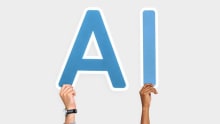We'll have to look at business differently: Talend CEO Christal Bemont

Christal Bemont, CEO of data integration and quality firm Talend, came on board at the start of 2020, just weeks before the COVID-19 pandemic developed into a global crisis. Prior to that she had spent almost 16 years at Concur, including a stint as Chief Revenue Officer after SAP acquired the business.
People Matters asked Christal what it was like to face a crisis of COVID-19's magnitude, just weeks after coming on board, and where she sees the data industry going as a result of the pandemic. Here are the highlights of the conversation.
You'd just started as CEO when COVID-19 hit—how did that change your plans and priorities?
Coming in right on the front end of COVID-19 was interesting. I had just been establishing a set of criteria by which I would lead the organization: a people-first approach is germane and important to the way I lead. That approach breaks down to how we take care of our people, and what kind of culture we want to have in our organization. I had established that I wanted a very transparent, authentic, and communicative organization, and had set that as one of my priorities.
In just the few short weeks after that, it became clear that COVID-19 was really going to put those principles and key attributes to the test. Very early on, we moved from communication of those priorities to: "How will they become part of what we do?" And that really became the foundation on which we built the game plan for how we would handle COVID-19.
Could you share a little more about that plan?
We had a three-pronged plan. When we talk about taking care of our people, the first thing that comes to mind is the health and well-being of our employees, our customers, and our partners. Then the second prong really went beyond that and into the mental and emotional well-being of our employees—the acknowledgement that isolation was going to be a very real situation, that people were working from home in a manner that was not natural to them—with disruptions, with anxiety, with constraints. That was foundational.
And the third thing was how we take care of the business aspect. How could we support our customers at a time when they are searching for answers, and support our employees so that they can be there for the customers?
It really became important to use these three pillars as a way to make decisions on how we would implement things. We had to make sure that we were not sacrificing any one of them.
On the topic of the business aspect, what are some impacts of COVID-19 you're seeing on the business side?
The first thing we're seeing is a lot of employees coming together to help solve COVID-19 issues based on what they specialize in. We've created a COVID response mechanism through which people can contribute according to their own expertise. One of the areas we've applied this to is health organizations around the globe: they are collecting an immense amount of data and making it available for researchers to try to solve the vaccines question or address other problems. The problem was that that data was just stored in a way that wasn't usable. So we aligned our employees to take the very thing that Talend does for our customers—data integration and data quality—and apply it to provide structured data that was much more useful.
The second thing is that customers are searching for answers, more than ever, and they are searching for answers to things that they don't have patterns for.
They are now faced with the need to look at their business differently: tough decisions like what adjustments they have to make to their business, questions around whether they can stay in business at all. And so they need to look forward, not back, because looking back does not represent a pattern that can predict the future now.
Do you think this focused approach will continue post-COVID and into the recovery?
I see this as a huge inflexion point. I think that for the foreseeable future, we will all be looking at business in a new way. When unfortunate things like this happen, whether the global financial crisis or 9/11 or if you want to go all the way back to the 1930s and the Great Depression, these inflexion points cause people to adjust and innovate—they force people to look at the world differently and look at how they can perform at a higher level.
I think that will persist for some time, and I think new data sources will come into play that will be important for people to look at an entire set of data in order to make informed decisions and pivot the products and services or technology that they're offering.
What challenges do you think will arise alongside these opportunities?
I think there will continue to be companies and industries that struggle to calibrate their approach, and on our part, we will be trying to align with them to provide them with the answers they need. One of the things that will be very interesting is how business continuity plans change. Right now, these plans are location and region-based, and I don't think that any company has planned for a situation where every place around the world is impacted at the same time. This is going to change the level of planning that organizations do.
As to the industries that are likely to need help—definitely healthcare, travel, some of the leisure industries. Right now, healthcare is so overly taxed that coming out of this, they will absolutely have to figure out a new form. Travel will have to look at fundamentals like when and how travel occurs. It really seems like every industry has to recalibrate and plan for the next time this happens.
Where do you see Talend's role in this massive recalibration?
Today, we oftentimes work with data analysts and data engineers, who sit in IT or Operations, and we see a time in the very near future when the business users will have more direct access to some of the tools that we offer—when they will have more visibility into what their data looks like and what they are basing their decisions on. And we see our path forward in empowering the business users to have confidence that they've made their decisions on a solid set of data. It's something we already do today, but for the back-office IT folks, and the next step really is to expand into the rest of the business so that they can benefit from it.












